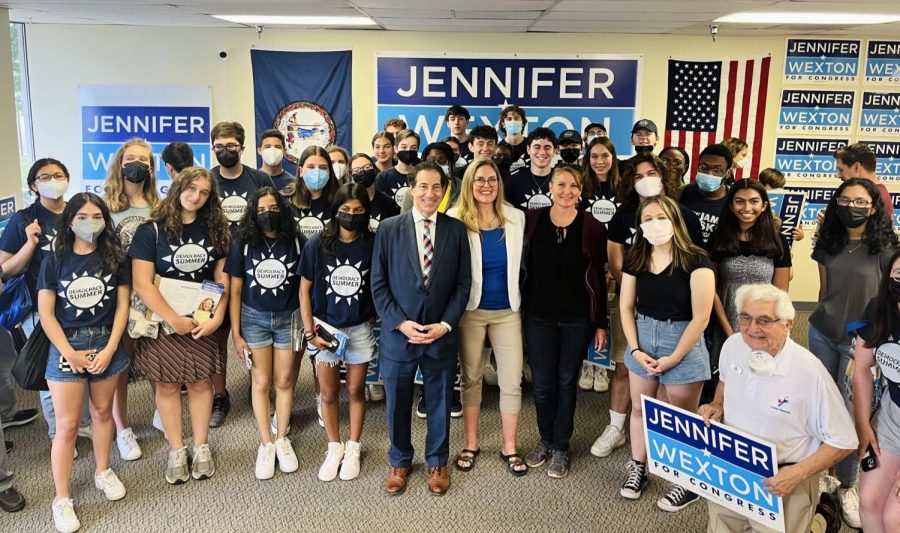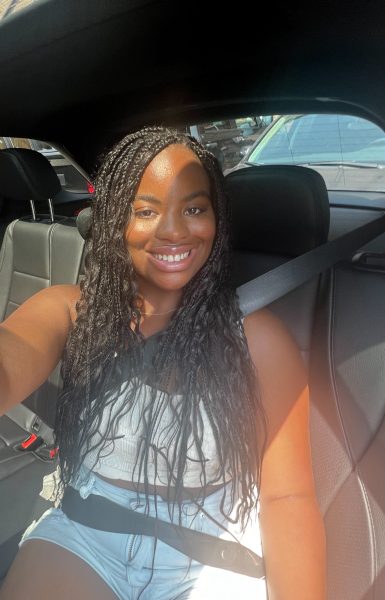Students can get politically involved even if they can not vote
Photo courtesy of Sophie Ehrlich
On July 16, 2022, Democracy Summer fellows meet Representatives Jennifer Wexton and Jamie Raskin to discuss the importance of canvassing during a mid-term election.
November 16, 2022
The commercials viewers watch from the comfort of their homes have been filled with political propaganda at every hour. With potential voters hearing why they should or shouldn’t elect a candidate to office, what does it mean to those who can’t participate in the election? Do they still have a voice in the midterm elections?
Sophie Ehrlich, an MCPS High School alumni who graduated from Thomas Wootton High School, now works for the Raskin for Congress team as their Field Director in addition to managing the DMV branch of Raskin’s educational Summer program.
“Democracy Summer is a summer program started by Congressman Jamie Raskin to help educate young people on political organizing,” Ehrlich said. “It started in 2011 when Congressman Raskin was running for Senate. It was first an opportunity for the children of his friends and family members to get involved in his campaign, get service hours and hear from speakers.”
Many WCHS are interested in getting involved with local politics outside of the classroom Although students have school clubs to explore those interests, having a direct opportunity is a valuable experience that could help them build their platforms.
“It’s always great to see the access [fellows] are able to have and to ask these influential speakers any questions they have,” Ehrlich said. “I think another positive aspect of this program is how the youth network due to the passions they share. MoCo for Change was a group of democracy Summer Fellows that got together.”.
With the positive aspects of student advocacy and community involvement, there are also some negative aspects. These negative aspects come directly from voter interactions between a volunteer and a potential voter. Like when students phonebank for potential candidates they sometimes receive aggressiveness or non-receptiveness from ideal voters. These moments prepare WCHS students for the real world. By opening their minds and welcoming all sorts of experiences to come, it welcomes them into the real world.
“I think canvassing has taught fellows patience and that not everyone thinks like you,” Ehrlich said. “In areas like Pennsylvania and Virginia, people aren’t going to think the same as you due to living different lives and having different mentalities. Listening to what others view and hearing what they have to say opens your perspective and also improves your conversational skills.”
Although there are students who do not know how to get involved in their local affairs or how to care about what is going on, their indifference carries more weight than they believe. Becoming active in local politics could benefit WCHS students more than they realize.
“Holding voter registration drives is a big thing because in this country you cannot vote without being registered,” Ehrlich said. “In Maryland, the voting age is 16, so it would be great to get younger voters involved in their local elections and primaries through discussions and encouraging them to vote.”
Many of the youth across the county may feel like they are unheard or that their voices may not matter. Little do they know their leaders want to hear more from them. Students contacting their elected officials could bring them more clarity and gain access to their futures.
“It depends on where you live. You can go online and insert your address to find out your local representatives,” Ehrlich said.“For some in the Montgomery County area, their local representative is Jamie Raskin. They can call our office number or email us and we would definitely respond. As well, those interested in contacting their local officials could email them.”
Having a lack of knowledge could be seen as a way of accepting ignorance, but to some WCHS students, it is the inability to access the right sources or people to help students form an educated opinion.
“I was drawn into advocacy by my AP Government and Politics class,” WCHS sophomore Alexa Rockwood said. “I found a love for politics, and using the powers I have to make a change. It really inspired me to go out and search for campaigns that I could help with during our midterm elections.”
Getting involved in local MCPS events could truly bring enlightenment to WCHS. With the opportunity to earn clarity and make new friends through shared beliefs, getting involved is a great way to close the awkwardness between students.
“The thing I’ve enjoyed most Is being listened to and understood when I advocate for myself and for other students. It’s the best feeling when people believe your ideas. I feel like our candidates during this election cycle make students feel heard and understood.” Rockwood said.
The fear of being accepted or unacknowledged can make some students wary of interacting with their community. However, taking a leap of faith has the potential to truly change more than what students anticipated.
“I would tell students to exercise their rights, as well as know them,” Rockwood said. “Don’t be afraid to speak up, because there will always be someone willing to listen and help you.”



